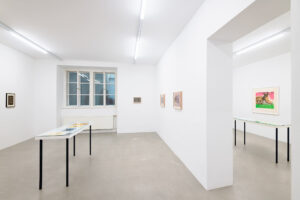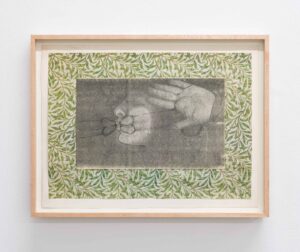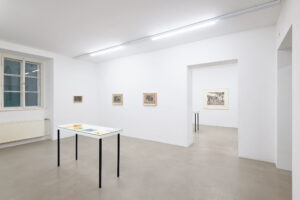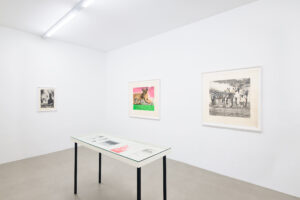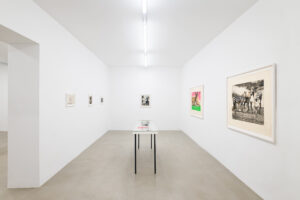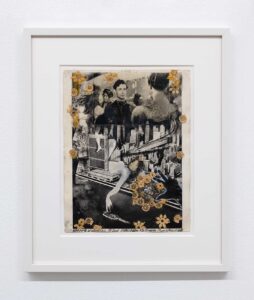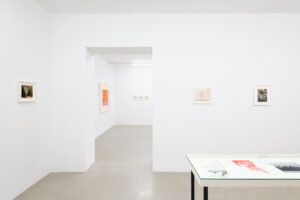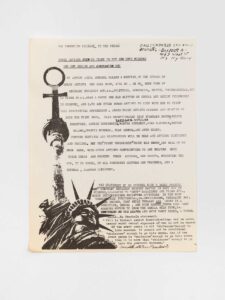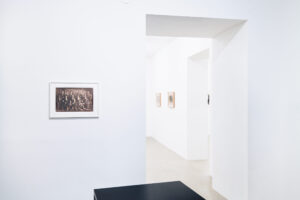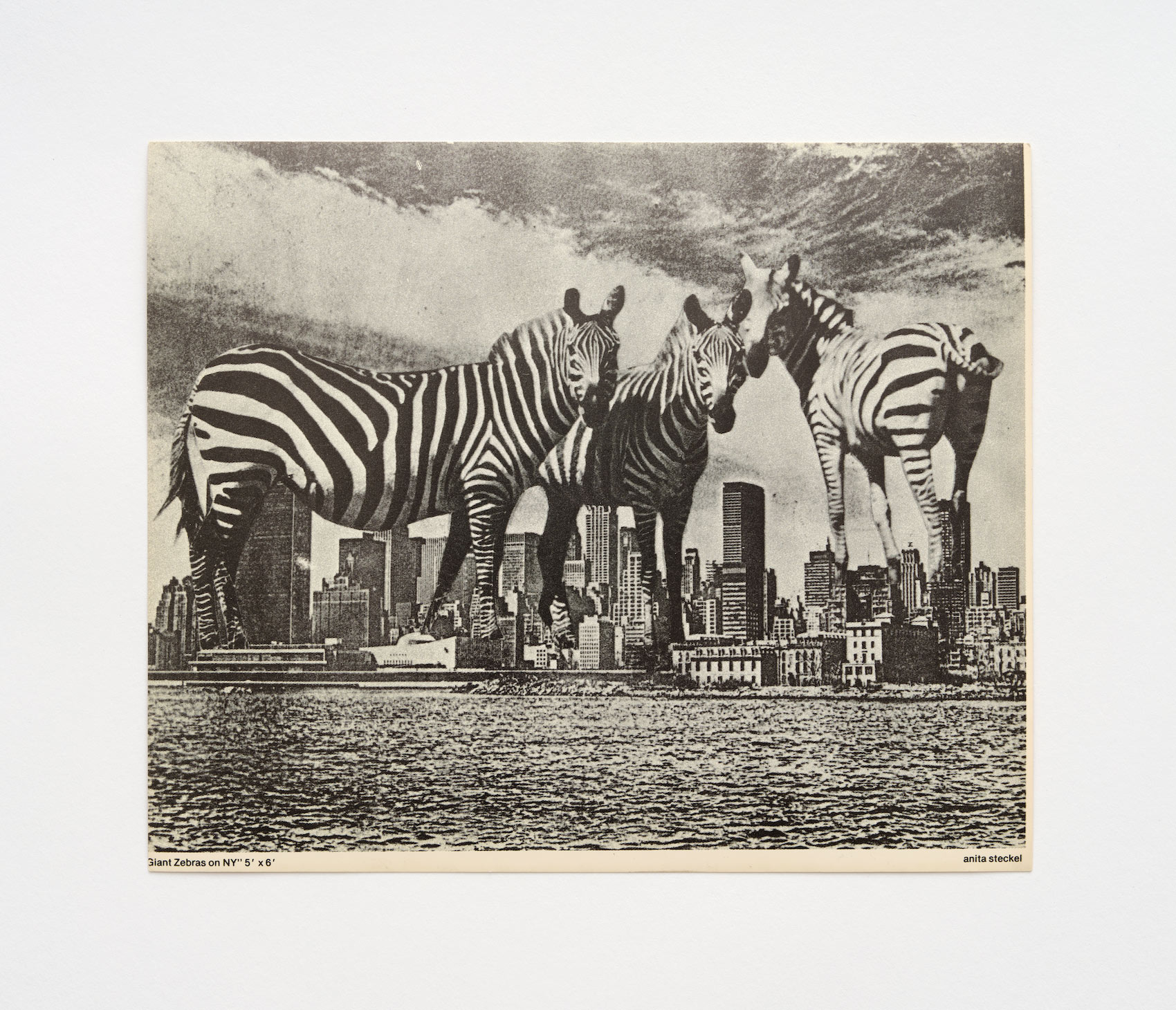
For this year’s Curated by festival, WONNERTH DEJACO presents the first European solo exhibition to focus on the work of American feminist artist, political satirist and activist Anita Steckel as well as a series of readings by French writer Constance Debré and British artist, writer and political dominatrix Reba Maybury. Curated by writer and curator Juliette Desorgues, LUST, a term suggestive of both desire and play, is an interdisciplinary programme, which places three transgenerational figures in dialogue to reflect on questions of power, gender and sexuality.
A key figure of the 1950s and 60s New York downtown scene, Anita Steckel developed an oeuvre consisting of photographic, collage- and drawing-based work that blossomed during the context of the Western women’s liberation movement of the 1970s. In 1973, she co-founded the Fight Censorship collective with fellow New York-based feminist artists Judith Bernstein, Louise Bourgeois, Joan Semmel and Hannah Wilke amongst others, a group brought together through their common practice of sexually explicit art against a backdrop of prevailing sexism and puritanism in the art establishment.[1] Drawn from Steckel’s archive and estate, the works presented in this exhibition span five decades of her rich oeuvre, from the 1960s to the 2000s. Phallic symbolism is depicted throughout as a cypher of systemic patriarchal power that Steckel playfully subverts as both an object of satirical intent and an apparatus of sexual desire. The imposing naked bodies of women are also deployed as signifiers both of vulnerable unease and emancipatory release.
Constance Debré and Reba Maybury will perform readings of new and recent texts within the context of Steckel’s exhibition for the opening weekend. Whilst Debré’s style of writing piercingly chronicles her own personal life, the rejection of institutional bourgeois structures and exploration of her queer sexuality; Maybury’s texts act as conceptual manifestos to her work as a political dominatrix which centres on subverting traditional gender power relations through and within sex work.
Echoing the feminist literary and artistic historical context in Vienna, from Elfriede Jelinek to Valie Export, each of these three voices confronts the systemic mechanisms of power, laying bare their structures and subverting their entrapments with humorous, raw and biting force. The self, as a lived and metaphorical entity, is deployed as a key trope to touch on wider questions of sexuality and gender, and especially, women’s role within society. Desire, both imagined and embodied, comes to act as a central cue, one which serves as a form of unabashed disruption to the hegemony of the normative patriarchal public sphere.
The exhibition responds to the framing of this year’s curated_by festival—“The Neutral”— as a provocation. Within the context of today’s social and political upheavals, from the recent overturning of the Roe vs Wade decision in the United States to the denial of Transgender rights in numerous Western countries, any notion of neutrality is debunked when considering the on-going battles over the governance of bodies and the geo-political consequences of these power relations. And yet, given this context, what does it mean to consider the work of a second wave feminist figure such as Anita Steckel in a time of ‘heteropessimism’, as coined by writer Asa Seresin?[2] It is in the refusal towards ambivalence as a political and embodied stance, which marked Steckel’s much overlooked life and work, that answers can be found. [3] As with Steckel, the work of Debré and Maybury indeed also reveals how, in lieu of neutrality, a position may be taken, one which boldly asserts a self-determination that spits in the eye of conservative and repressive forces.
[1] Fight Censorship Group “Women Artists Join to Fight to Put Sex into Museums and Get Sexism and Puritanism Out”, 1973
[2] ‘On Heteropessimism: Heterosexuality is nobody’s personal problem’, The New Inquiry, 9/10/2019, accessed https://thenewinquiry.com/on-heteropessimism/ 28/07/2023.
[3] See also Wendy Vogel’s reading of Steckel’s work in light of today’s pressing concerns: ‘Reconsidering Anita Steckel in the Age of Heteropessimism’, Mousse Magazine, Issue 82, February 2023.
The readings by Constance Debré and Reba Maybury took place on 09 September, 2023.
Acknowledgements
With heartfelt thanks to the artists and galleries: Constance Debré, Hannah Hoffmann Gallery Los Angeles, The Estate of Anita Steckel, Reba Maybury, Ortuzar Projects New York; and to the following individuals for their invaluable support: Hugo Bausch Belbachir, Kévin Blinderman, Julie Boukobza, Steven Cairns, Flora Citroën, Alban Diaz, Cécile B. Evans, David Gyscek, Paul-Alexandre Islas, Axel Koschier, Ursula Mayer, Rachel Middleman, Kenta Murakami, Kari Rittenbach, Asa Seresin and Nicholas Tammens.
Artist Biographies
Constance Debré is a French writer living in Paris. She is the author of several novels: Playboy, Love Me Tender, Nom and Offenses. Love Me Tender was recently published by Semiotext(e) in English. Her books have also been translated into Italian, German, Danish and Swedish.
Reba Maybury is an artist, writer and political dominatrix sometimes working under the name Mistress Rebecca. She lives and works in Jutland, Denmark and London, UK. Her work explores the tension between her perceived strength as an object of transactional fantasy and how, through the reality of sex work and gender, she attempts to turn this power into something tangible. She is the author of Dining with Humpty Dumpty (Wet Satin Press, 2017) and Faster than an erection (MACRO, 2021).
Anita Steckel (1930-2012) studied at Cooper Union and Alfred University, as well as the Art Students League of New York, where she taught from 1984 until her death. From the early 1970s, she lived at Westbeth Artists’ Housing in the West Village. She was recently the subject of solo exhibitions at the Stanford Art Gallery, Stanford (2022), curated by art historians Rachel Middleman and Richard Meyer, and at Hannah Hoffman Gallery, Los Angeles (2021). Previous exhibitions include Legal Gender: The Irreverent Art of Anita Steckel, Jacki Headley Art Gallery, California State University, Chico and Verge Center for the Arts, Sacramento (2018); Anita of New York, The Suzanne Geiss Company, New York (2013); Anita Steckel and Friends, Westbeth Gallery, New York (2012); and Mom Art: 1963–1965, Mitchell Algus Gallery, New York (2008). Her work featured in the recent institutional exhibitions Maskulinitäten, Bonner Kunstverein, Germany (2019); Cock, Paper, Scissors, ONE National Gay & Lesbian Archives, Los Angeles (2016); Black Sheep Feminism: The Art of Sexual Politics, Dallas Contemporary (2016); and Identity Crisis: Authenticity, Attribution and Appropriation, The Heckscher Museum of Art, Huntington, NY (2011). She was the recipient of a Pollock-Krasner Foundation Grant (2005), a National Endowment for the Arts grant (1983), and a MacDowell Fellowship (1966). Her work is in the permanent collections of the Brooklyn Museum, New York; Bryn Mawr College, Pennsylvania; Edwin A. Ulrich Museum of Art, Wichita State University, Kansas; Smith College Museum of Art, Northampton, Massachusetts; and Verbund Collection, Vienna, among others.
Curator Biography
Juliette Desorgues is a curator and writer based in Paris. She was previously Curator at MOSTYN, Wales and Associate Curator at the Institute of Contemporary Arts, London. She has also held curatorial positions at the Barbican Art Gallery, London and Generali Foundation, Vienna. She studied at the University of Edinburgh, the University of Vienna and University College London.
